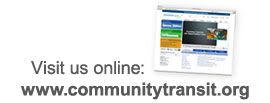
For years, there have been complaints that drivers don't do enough to make people pay their fares. In fact, the agency's policy was for drivers to ask for fare once then not argue with a rider. The policy is to ensure the safety of the driver and other riders, and to keep the driver focused on driving the bus.
If you ask some people, they'll say fare evasion on buses is rampant. On some routes, in some areas, with some riders, it is a problem. But we had our drivers and monitors do a survey recently and found that on all Community Transit buses the fare evasion rate (those who underpay or don't pay at all) is about 2 percent. One can say that's a small number, 2 out of 100 people, but with ridership in the millions it adds up.
When we started Swift bus rapid transit, with its off-board fare payment and no fare box, we stepped up the practice of having deputies ride on buses. In the past it was more a symbol of security, but with changes to state law authorizing civil citations for non-fare payment, the deputies had a new job - fare enforcement.
Our drivers started keeping logs of fare evasion, filling out forms to indicate which routes, which locations and which times of day fare evasion was occuring most often. The deputies use this information to decide which buses to ride, in uniform or in plain clothes. A problem arose, however, when deputies encountered a fare evader and their excuse was "Well, the driver let me ride anyway."
By handing the fare evader the new card, the rider is warned and has no excuse. In fact, one supervisor told me last week that a driver handed a card to a gentleman who had underpaid. The guy sat down, read the card then came back to the front and paid the rest of his fare. Good call!
On Swift, the ambassadors are there to check fares and educate riders about how to pay fares on this different type of service. Because it's an honor-payment system, fare evasion is higher than on the rest of the system (up to 6 percent), but there is also a greater risk of getting caught as we have more patrols checking for fare evasion.
Our hope is, with this new reminder, more people will pay their fare without hassle. Drivers can remain focused on the road and deputies can do their job without worrying that a fare evader "has an excuse."






i dont mind saying there wouldnt be a fare paying problem if swift was not running in the first place!! there was nothing wrong with a regular route between everett station and aurora village. bring back route 100
ReplyDeleteMaybe you should have fare enforcement on the 201 and 202 I get sick of seeing people hold up the bus with there excuses as to why they can't pay and than asking all the other riders for money so they can ride.
ReplyDeleteagree with the 201/202, lots of trash riding that bus and i never see enforcement.
ReplyDeleteits up to the drivers rather to let you on or not usually
ReplyDeletesuch as if you dont pay your fare the driver can tell you not to get on
ReplyDelete@Anonymouses #2 and #3, our deputies have been out on Routes 201/202 in the past few weeks. With limited resources we don't ride every trip but do try to target some specific locations and times of day for enforcement. Let's hope you see them out there soon!
ReplyDelete